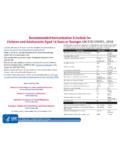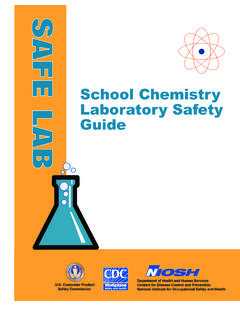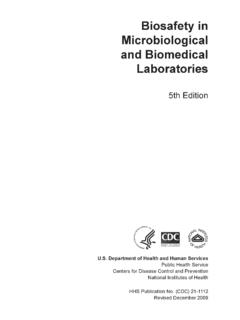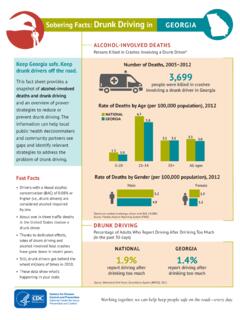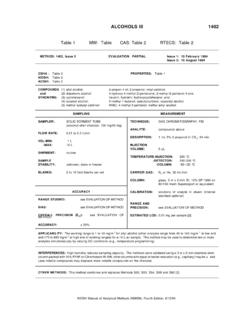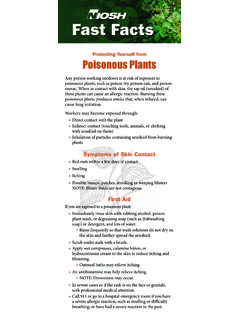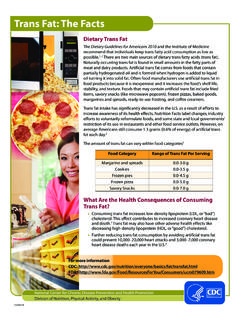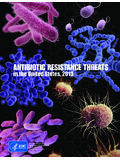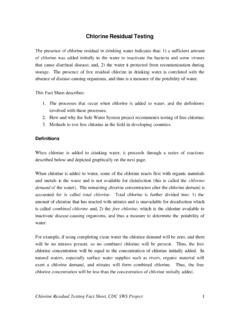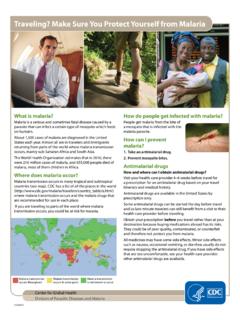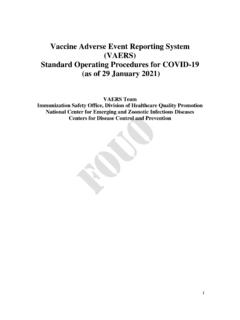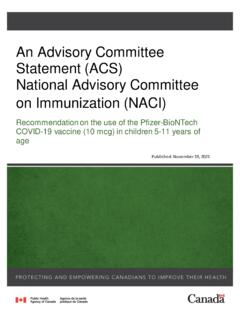Transcription of Interim Clinical Considerations for COVID-19 Vaccine in ...
1 Clinical Considerations for COVID-19 Vaccine in children Ages 5 11 YearsKate Russell Woodworth, MD, MPH, FAAPACIP MeetingNovember 2, 2021 Outline of Presentation The Pfizer-BioNTech COVID-19 Vaccine for children ages 5 11 years Formulation and dosing Vaccine recipients Underlying medical conditions Prior SARS-CoV-2 infection children with a history of MIS-C Patient and parent/guardian counseling Vaccine administration Coadministration Administration errorsPfizer-BioNTech COVID-19 Vaccine Formulation and Dosing in children Ages 5 11 yearsFormulation and Dosing for Pfizer-BioNTech COVID-19 VaccinesFormulation for 12-year-olds (purple cap)Formulation for 5 11-year-olds (orange cap)Age group12 years and older5-11 yearsVial cap colorDose (mRNA concentration)30 ug10 ugInjection mLFill Volume (before dilution) mLAmount of Diluent* Needed per mLDoses per Vial6 (after dilution)10 (after dilution)*Diluent: sterile Sodium Chloride Injection, USP (non-bacteriostatic.)
2 DO NOT USE OTHER DILUENTS)Modified from and Dosing for Pfizer-BioNTech COVID-19 VaccinesFormulation for 12-year-olds (purple cap)Formulation for 5 11-year-olds (orange cap)Storage conditionsUltralow temperature freezer (-90 C to -60 C)9 months6 monthsFreezer (-25 C to -15 C)2 weeksN/ARefrigerator (2 C to 8 C)1 month10 weeksModified from and Dosing for Pfizer-BioNTech COVID-19 VaccinesFormulation for 12-year-olds (purple cap)Formulation for 5 11-year-olds (orange cap)Number of doses22 Interval3 weeks (21 days)3 weeks (21 days)Additional primary doseModerate and severe immunocompromiseNot recommendedBooster doseNot recommended 12 17 years Not recommendedRecommended for certain groups 18 years**Individuals 65 years and older or individuals ages 18 years and older who live in long-term care settings, have underyingmedical conditions, or who work or live in high-risk settings.
3 Mbaeyi S, Oliver SE, Collins JP, et al. The Advisory Committee on Immunization Practices Interim Recommendationsfor Additional Primary and Booster Doses of COVID-19 Vaccines United States, 2021. MMWR MorbMortal WklyRep. ePub: 29 October 2021 Vaccine Dosage children should receive the age-appropriate Vaccine formulation regardless of their size or weight. As opposed to many medications, Vaccine dosages are based on age and not size or weight. The dosage should be based on the child s age on the day of vaccination. If a child turns from 11 to 12 years of age in between their first and second dose and receives 5 11 years 10 g (orange cap) for their second dose, they do not need to repeat the dose and this is not considered an error per the RecipientsUnderlying Medical Conditions children with underlying medical conditions may be at increased risk for severe illness from COVID-191, however, severe COVID-19 can occur in children with and without underlying medical conditions.
4 COVID-19 primary vaccination would be recommended for everyone ages 5 years and older, regardless of underlying medical #ChildrenAndTeens2 or Prior SARS-CoV-2 Infection People with known current SARS-CoV-2 infection should defer vaccination at least until the person has recovered from the acute illness (if the person had symptoms) AND they have met criteria to discontinue isolation1. Isolation and precautions can typically be discontinued 10 days after positive test if asymptomatic or 10 days after symptom onset and after resolution of fever for at least 24 hours) Serologic testing to assess for prior infection is not recommended for the purpose of Vaccine decision-making2. 1 SARS-CoV-2 Infection COVID-19 primary vaccination would be recommended for everyone ages 5 years and older, regardless of a history of symptomatic or asymptomatic SARS-CoV-2 infection or seropositivity.
5 >7 million adolescents ages 12 15 years have been fully vaccinated with Pfizer-BioNTech COVID-19 Vaccine in the United States1and in the general population there has been no safety concerns associated with vaccination of those who had prior #vaccination-demographicPrior SARS-CoV-2 InfectionData from Clinical trials in children ages 5 11 years indicate that the Pfizer-BioNTech COVID-19 Vaccine can be given safelyto those with evidence of a prior SARS-CoV-2 evidence suggests that protection from reinfection is high after initial infection but decreases with time due to waning heterogeneityexists in individual immune response to infection, and in adults, asymptomatic infection leads to lower antibody epidemiologic evidence from adults and adolescents indicates that vaccination following infection increases protection from subsequent infection, including in the setting of more infectious 2021, Science: ; Cavanaugh 2021, MMWR; 70(32):1081-3.
6 Lumley 2021; Clin Infect Dis; doi: Gazit2021, medRxiv; Shenai2021, medRxiv; Limitations of Antibody Testing Antibody tests cannot determine when a person was infected. Antibody tests greatly vary in their sensitivity, particularly >3 months after infection. People can test positive on commercial antibody tests even after other markers of immunological response, such as neutralizing antibodies, have waned. At this time, there isnoFDA-authorized or approved testthatproviders or the public can usetoreliablydeterminewhether a person is protected of children with a History of Multisystem inflammatory syndrome in children (MIS-C) The benefits of COVID-19 vaccination for children and adolescents with a history of MIS-C are likely to outweigh a theoretical risk of an MIS-like illness or the knownrisks of COVID-19 vaccination for people who meet all of the following criteria: 1) Clinical recovery has been achieved, including return to normal cardiac function; 2) It has been 90 days since their diagnosis of MIS-C.
7 3) They are in an area of high or substantial community transmission of SARS-CoV-2, or otherwise have an increased risk for SARS-CoV-2 exposure and transmission; 4) Onset of MIS-C occurred before any COVID-19 vaccination. Vaccination of children with a History of Multisystem inflammatory syndrome in children (MIS-C) COVID-19 vaccination may also be considered for children with a history of MIS-C who do not meet all the prior criteria. Experts view Clinical recovery, including return to normal cardiac function, an important factor when considering COVID-19 vaccination. Additional factors when considering individual benefits and risks may include:1) An increased personal risk of severe COVID-19 ( , age, underlying conditions)2) Timing of immunomodulatory therapiesChildren Diagnosed with MIS-C after COVID-19 Vaccination In the rare instance a person develops MIS-C or a similar Clinical illness after receipt of a COVID-19 Vaccine , referral to a specialist should be considered.
8 Because MIS-C is a condition known to occur with SARS-CoV-2 infection, these individuals should be assessed for laboratory evidence of current or prior SARS-CoV-2 cases should be reported to Vaccine Adverse Event Reporting System (VAERS) from Clinical Immunization Safety Assessment Project is available : Expected Side Effects from Pfizer-BioNTech COVID-19 Vaccine children may experience fewer side effects than adolescents or young adults1. children with evidence of prior infection may have fewer side effects than those without evidence of prior infection1. Expected side effects include Local: pain, swelling, erythema at the injection site Systemic: fever, fatigue, headache, chills, myalgia, arthralgia, lymphadenopathy Routine antipyretic or analgesic medications can be taken for the treatment of post-vaccination local or systemic symptoms, if medically appropriate.
9 In general, Aspirin is notrecommended for use in children and adolescents 18 years due to risk of Reye s syndrome . 1 : Possible Risk of Myocarditis Myocarditis and/or pericarditis have occurred rarely in some people following receipt of mRNA COVID-19 vaccines, typically within a few days following receipt of the second dose. The observed risk is highest in males 12 29 years of age1. The risk of myocarditis or pericarditis after receipt of an mRNA COVID-19 Vaccine is lower than the risk of myocarditis associated with SARS-CoV-2 infection in adolescents and JW, Wallace M, Hadler SC, et al. Use of mRNA COVID-19 Vaccine After Reports of Myocarditis Among Vaccine Recipients: Update from the Advisory Committee on Immunization Practices United States, June 2021.
10 MMWR MorbMortal WklyRep 2021;70:977 982. DOI: 2 Boehmer TK, Kompaniyets L, LaveryAM, et al. Association Between COVID-19 and Myocarditis Using Hospital-Based Administrative Data United States, March 2020 January 2021. MMWR MorbMortal WklyRep 2021;70:1228 1232. DOI: : Possible Risk of Myocarditis No cases of myocarditis or pericarditis were reported in Clinical trial for children ages 5 11 years (n=3,082), although the study was not powered to assess the risk of myocarditis1. The baseline risk of myocarditis is much higher in adolescents ages 12 17 years compared to children ages 5 11 years. 1 : Possible Risk of Myocarditis FDA has authorized the Pfizer-BioNTech COVID-19 Vaccine in children ages 5 11 years based on the determination that the benefits of COVID-19 vaccination outweigh risks in this population.
